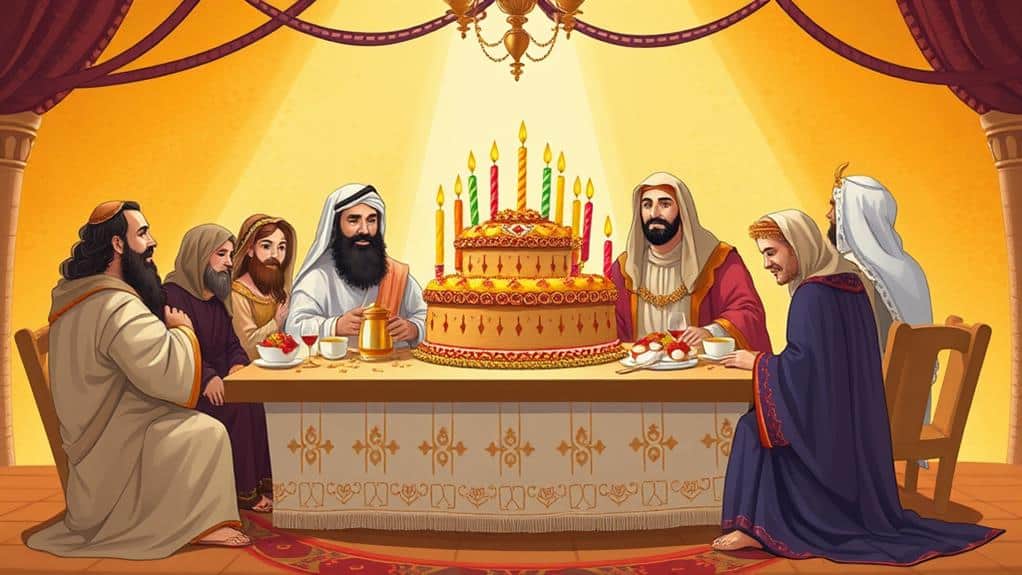We delve into the intriguing mystery of Esau, where divine sovereignty meets human choices—sort of like choosing between a gourmet meal and a bowl of lentil stew!
God's preference for Jacob over Esau highlights His sovereignty, independent of Jacob's merit (Romans 9:10-13).
Esau's hasty trade of his birthright for a mere meal exemplifies how he underestimated his spiritual legacy, leading to profound consequences.
As we explore the delicate balance between divine decisions and human actions, we uncover a rich tapestry that influences the trajectory of history.
By examining the importance of birthright and Esau's pivotal choices, we gain deeper insights into the enigma of Esau and the overarching theme of God's sovereignty.
Key Takeaways
- God's preference for Jacob over Esau was rooted in divine sovereignty, not Jacob's worthiness or Esau's unworthiness.
- Esau's impulsive decision to trade his birthright for lentil stew reflected his lack of respect for his spiritual heritage.
- The concept of "hate" in the biblical context signifies priority in God's choices, not literal animosity towards Esau.
- Esau's choices had monumental consequences, altering the direction of his family and societal legacy.
- The narrative of Esau serves as a cautionary tale on the importance of intentional choice-making and valuing spiritual heritage.
Understanding God's Sovereign Judgment
One of the most intriguing aspects of the narrative of Esau and Jacob is the apparent preference God shows towards Jacob, which raises questions about the nature of divine sovereignty.
As we examine the story, we see that God's preference for Jacob is rooted in His divine sovereignty, rather than any inherent worthiness in Jacob. The term "hate" in this framework signifies priority, not literal animosity.
This distinction highlights the balance between divine sovereignty and human agency. We observe that God's decisions are tied to a broader divine plan, with Jacob chosen for a specific purpose in covenant history.
Our understanding of this narrative reveals the intricate interplay between God's sovereignty and human choices, illustrating that both are integral to the unfolding of God's master plan.
The Significance of Birthright
Two distinct yet interconnected themes emerge as we explore the significance of birthright in the narrative of Esau and Jacob.
We notice that the birthright symbolizes inheritance and divine covenant, representing a significant spiritual and material legacy passed through generations. Its implications are deep, tied to destiny and God's promises, and seen as a "golden ticket" to blessings and prosperity within family lineage.
As we examine the birthright's significance, we recognize its spiritual legacy, which Esau undervalued, treating it as insignificant and reflecting a lack of respect for spiritual heritage and the divine promise it represented.
The birthright's significance is multifaceted, and its implications are far-reaching, influencing the lives of Esau and Jacob in profound ways.
Its impact on their story serves as a lens through which we can better understand the complexities of divine sovereignty and human agency.
Esau's Fateful Life Choices
As we examine the significance of birthright in the narrative of Esau and Jacob, a natural question arises: what led Esau to treat his birthright with such disregard?
We see that Esau's impulsive decisions, such as trading his birthright for lentil stew, illustrate a prioritization of immediate satisfaction over long-term spiritual legacy. This choice had monumental consequences, reverberating through generations and altering family and societal direction.
Esau's undervaluation of the birthright reflects a lack of respect for spiritual heritage and the divine promise it represented. By examining Esau's fateful life choices, we gain insight into the importance of prioritizing spiritual discernment and considering the long-term impacts of our decisions.
Esau's narrative serves as a cautionary tale, highlighting the interconnectedness of personal decisions and the need for intentional choice-making.
Unpacking God's Relationship With Esau
Delving into the complexities of God's relationship with Esau requires an understanding of the nuances of divine sovereignty and the context of ancient biblical language.
We must consider that God's preference for Jacob over Esau is rooted in divine sovereignty, not personal animosity. The term "hate" in biblical language signifies priority, not literal hatred.
Esau's character, marked by impulsivity and undervaluation of spiritual heritage, has significant divine implications. His choices, such as trading his birthright for lentil stew, reflect a lack of respect for divine promise and covenant.
As we unpack God's relationship with Esau, we recognize that predestination plays a role in his predetermined destiny within the divine drama.
The Interplay of Fate and Choice
Our exploration of God's relationship with Esau reveals a complex narrative that highlights the interplay between fate and choice. As we investigate the story, we find that divine orchestration and human agency are intertwined.
Here are four key insights:
- Divine sovereignty: God's preference for Jacob over Esau is rooted in a broader divine plan.
- Human decisions: Esau's impulsive choices have monumental consequences, altering the course of his life and legacy.
- Fate implications: The birthright symbolizes a significant spiritual and material legacy, with deep implications for destiny and God's promises.
- Choice consequences: The story serves as a cautionary tale about the long-term impacts of choices, highlighting the need for spiritual discernment and character reflections.
Lessons From Esau's Story
Analyzing the narrative of Esau's story, we uncover a rich fabric of lessons that can be applied to our lives. One key takeaway is the danger of impulsivity, as seen in Esau's decision to trade his birthright for a fleeting pleasure. This choice not only had far-reaching consequences for his own life but also impacted the course of his family's history.
Additionally, Esau's actions demonstrate a disregard for his spiritual heritage, failing to grasp the significance of the birthright and its connection to God's covenant promises. As we reflect on Esau's story, we're reminded of the importance of considering the long-term implications of our choices and valuing our own spiritual heritage.
Reverence in Worship and Life
Esau's story serves as a stark reminder of the importance of reverence in our worship and daily lives.
We often overlook the significance of authenticity in our faith, but scripture emphasizes the need for genuine worship and ethical integrity.
Let's examine four key aspects of reverence in worship and life:
- Authentic Worship: We must endeavor for sincerity in our worship practices, recognizing God's desire for genuine devotion (John 4:23-24).
- Ethical Integrity: Our daily lives should reflect the values we claim to hold, demonstrating a commitment to moral principles (Proverbs 10:9).
- Respect for Spiritual Heritage: We must appreciate the significance of our spiritual inheritance, just as the birthright held deep implications for Esau's destiny.
- Conscientious Decision-Making: Our choices should be guided by spiritual discernment, considering the long-term consequences of our actions (Proverbs 12:26).
Frequently Asked Questions
What Other Biblical Examples Illustrate God's Sovereign Choice and Human Responsibility?
We see God's sovereign choice and human responsibility intertwined in various biblical examples, such as Jacob's Ladder (Genesis 28:12-15), Pharaoh's hardened heart (Exodus 4:21), Ruth's loyalty (Ruth 1:16-17), David's repentance (2 Samuel 12:13), Jonah's resistance (Jonah 1:1-3), and Solomon's wisdom (1 Kings 3:5-15).
How Do Different Christian Denominations Interpret the Concept of Predestination?
We examine various Christian denominations' interpretations of predestination, noting the Calvinist perspective on electing grace, the Arminian debate on free will, and the nuances of Lutheran views, Methodist beliefs, Baptist interpretations, and Orthodox understanding.
Can Individuals Change Their Predetermined Path Through Prayer or Actions?
We recognize that through transformative prayer and actions, individuals can change their predetermined paths by aligning with God's will, as seen in biblical examples such as Hezekiah's prayer in 2 Kings 20:1-6, where God altered his fate.
What Role Does Free Will Play in Shaping One's Spiritual Destiny?
We recognize that free will plays a significant role in shaping our spiritual destiny, as we exercise spiritual autonomy in our choices, while also acknowledging the possibility of divine intervention that can influence our paths.
How Can Readers Balance the Idea of Divine Sovereignty With Personal Agency?
We balance divine sovereignty and personal agency by recognizing God's overarching plan while exercising our free will, understanding that divine intervention can redirect our paths, as exemplified in Proverbs 16:9 and Romans 8:28.
Conclusion
We've unraveled the mystery of Esau, exploring the intricate dance between divine sovereignty and human agency. Through our examination, we've discovered that God's judgment is not arbitrary, but rather a response to human choices (Romans 9:13). Esau's story teaches us the importance of reverence in worship and authenticity in faith. As we reflect on his fateful life choices, we're reminded that our decisions have consequences, and integrity is essential in personal and communal endeavors.






